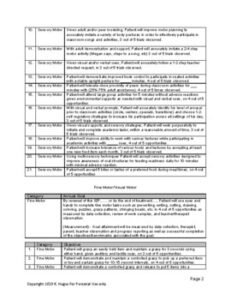So you’ve heard about pediatric occupational therapy screening, but you’re not quite sure what it entails. Well, fret not, because in this article, we’re here to give you a brief rundown of what exactly pediatric occupational therapy screening is all about. In a nutshell, it’s a process that helps identify any potential developmental delays or challenges that a child may be facing in their daily activities. This screening form, used by pediatric occupational therapists, aims to assess various areas of a child’s development, such as motor skills, sensory processing, and social-emotional skills. By identifying these challenges early on, therapists can provide the necessary support and intervention to help children thrive in their day-to-day lives. So, let’s delve into the world of pediatric occupational therapy screening and see how it can make a difference in a child’s life.

What is Pediatric Occupational Therapy?
Pediatric Occupational Therapy is a specialized branch of therapy that focuses on helping children develop the necessary skills to perform everyday activities and tasks with independence and confidence. Occupational therapists work with children who may have physical, mental, emotional, or sensory difficulties that affect their ability to fully participate in daily activities, such as self-care, play, and social interactions.
Definition
Pediatric Occupational Therapy Screening refers to the process of evaluating a child’s development and identifying any areas of concern or potential delay. It involves the systematic assessment of various skills, including fine motor, gross motor, sensory processing, visual-motor integration, self-care, and social interaction. The screening process helps to determine if a child would benefit from further evaluation and intervention by an occupational therapist.
Goals
The primary goal of pediatric occupational therapy screening is to detect any developmental issues or delays at an early stage, allowing for timely intervention and treatment. By identifying areas of concern, occupational therapists can develop individualized intervention plans to address specific needs and help children reach their developmental milestones.
Importance
Pediatric occupational therapy screening is crucial for several reasons. Firstly, it allows for the early detection of developmental issues, which may otherwise go unnoticed until they become more significant problems. Early identification enables prompt intervention and reduces the risk of further complications or delays in a child’s development. Additionally, screening helps occupational therapists and other healthcare professionals gather essential information about a child’s strengths and challenges, enabling them to create targeted intervention plans. Lastly, pediatric occupational therapy screening promotes the overall well-being and quality of life for children and their families by providing support and resources to enhance developmental outcomes.
Why is Screening Important?
Early Detection of Developmental Issues
Screening plays a vital role in the early detection of developmental issues in children. Many developmental delays, such as delays in fine motor skills, sensory processing, or social interaction, may not be immediately noticeable or easily detectable by parents or caregivers. Through screening, occupational therapists can identify potential delays or difficulties and intervene early, when children’s brains are most adaptable and responsive to intervention. Early detection allows for timely and targeted intervention to address these challenges, helping children build a strong foundation for future development.
Prevention of Further Complications
By screening children for potential developmental delays or issues, occupational therapists can prevent further complications or delays in their overall development. Early intervention helps address and overcome challenges before they become more significant problems. For example, if a child is experiencing delays in fine motor skills, the occupational therapist can provide targeted exercises and activities to improve these skills, preventing them from impacting the child’s ability to perform everyday tasks like buttoning clothes or holding a pencil. Screening provides an opportunity to address challenges proactively and minimize their impact on a child’s development.
Individualized Treatment Planning
Screening is essential for creating individualized treatment plans tailored to each child’s specific needs. The assessment process helps occupational therapists understand the areas in which a child may be struggling and the underlying factors contributing to those challenges. By identifying these concerns, therapists can develop targeted intervention plans that address the child’s unique strengths and challenges. Individualized treatment planning ensures that interventions are tailored to the child’s specific needs and goals, leading to more effective outcomes and improved overall development.
When Should Children be Screened?
Age Milestones
Children should undergo pediatric occupational therapy screening at various age milestones to monitor their development and detect any potential delays. The exact age at which screening should occur may vary depending on the healthcare system and specific recommendations. However, common age milestones for screening include:
- Newborn screening: Shortly after birth, healthcare professionals may assess a newborn’s reflexes, muscle tone, and general development.
- Developmental screening at regular intervals: Pediatricians often perform developmental screenings at well-child visits, such as at 9 months, 18 months, and 30 months. These screenings help identify any potential delays or concerns regarding a child’s development compared to typical age milestones.
Red Flags for Developmental Delays
Parents and caregivers can also be vigilant for red flags or warning signs that may indicate a developmental delay requiring further screening. These red flags can vary depending on the specific area of development but can include:
- Delays in reaching physical milestones (e.g., rolling over, sitting up, crawling, walking)
- Difficulty with fine motor skills, such as using utensils or writing
- Challenges with self-care tasks, like dressing or feeding oneself
- Sensory sensitivities or difficulties processing sensory information
- Limited social interactions or difficulties with social skills
- Lack of interest or engagement in age-appropriate play activities
If any of these red flags are observed, it is essential to consult with a healthcare professional or occupational therapist for further screening and evaluation.
Referrals from Other Healthcare Professionals
Children may also be referred for pediatric occupational therapy screening by other healthcare professionals who have identified potential concerns. For example, a pediatrician, speech therapist, or psychologist may refer a child for occupational therapy screening if they observe challenges in specific areas of development that can be addressed through occupational therapy intervention. Referrals from other professionals can provide valuable insights and ensure comprehensive evaluation and support for a child’s development.
Different Methods of Occupational Therapy Screening
Observation
Observation is a fundamental method used in pediatric occupational therapy screening. Occupational therapists closely observe a child’s behavior, movements, and interactions during various activities. Observation allows therapists to assess the child’s strengths, challenges, and overall development in different contexts, such as play, self-care, or school-related tasks. By observing a child’s responses and actions, therapists can gather valuable information about their motor skills, sensory processing, social interactions, and overall functioning.
Standardized Assessments
Standardized assessments are another essential tool used in pediatric occupational therapy screening. These assessments involve the use of specific tests or measures that have been validated and normed on a large population of children. Occupational therapists administer standardized assessments to gather objective data about a child’s performance compared to their peers. These assessments can provide valuable insights into a child’s strengths, weaknesses, and specific areas that may require further intervention. Examples of standardized assessments commonly used in pediatric occupational therapy screening include the Peabody Developmental Motor Scales, the Sensory Profile, and the Beery-Buktenica Developmental Test of Visual-Motor Integration.
Parent/Caregiver Interviews
In addition to observation and standardized assessments, occupational therapists often conduct interviews with parents or caregivers as part of the screening process. These interviews help gather valuable information about a child’s history, milestones, and daily routines. Parents and caregivers can provide insights into any concerns they may have noticed and provide valuable context for the child’s behaviors and actions. Interviews with parents or caregivers are an essential part of developing a comprehensive understanding of a child’s strengths, challenges, and specific needs.
Medical Records Review
Reviewing medical records can also be a valuable component of pediatric occupational therapy screening. Occupational therapists may review medical records from healthcare providers, including pediatricians, specialists, or therapists, to gather information about a child’s medical history, previous evaluations, or any diagnoses that may impact their development. Medical records can provide additional context and contribute to a more comprehensive understanding of a child’s overall well-being and potential underlying factors affecting their development.

Areas Covered in Pediatric Occupational Therapy Screening
Pediatric occupational therapy screening covers a broad range of areas to assess a child’s overall development and specific needs. Some of the key areas typically covered in the screening process include:
Fine Motor Skills
Fine motor skills refer to the ability to use small muscles, usually in the hands and fingers, to perform precise movements and tasks, such as buttoning clothes, tying shoelaces, or using utensils. Pediatric occupational therapy screening assesses a child’s fine motor skills, including their hand-eye coordination, dexterity, and control, to determine if any delays or challenges are present.
Gross Motor Skills
Gross motor skills involve using the large muscles of the body to perform activities such as running, jumping, climbing, or throwing a ball. Occupational therapy screening evaluates a child’s gross motor skills, including their balance, coordination, strength, and overall physical abilities. Identifying any delays or difficulties in gross motor skills is crucial for promoting a child’s physical development and ability to engage in various activities.
Visual-Motor Integration
Visual-motor integration refers to the ability to coordinate visual input with motor output. It involves skills such as copying shapes or writing letters, which require the integration of visual perception and fine motor coordination. Pediatric occupational therapy screening assesses a child’s visual-motor integration skills to identify any challenges or delays that may impact their ability to perform tasks that require visual-motor coordination.
Sensory Processing
Sensory processing refers to how the brain organizes and responds to sensory information from the environment. Occupational therapy screening evaluates a child’s sensory processing skills, including their ability to regulate and respond appropriately to sensory input. This assessment helps identify any sensory sensitivities or difficulties that may affect a child’s behavior, attention, or overall participation in activities.
Self-Care Skills
Self-care skills include tasks such as dressing, feeding, grooming, and toileting. Pediatric occupational therapy screening assesses a child’s self-care skills to determine their level of independence and identify any challenges or delays. This evaluation helps occupational therapists develop intervention plans to enhance a child’s ability to perform daily self-care activities.
Play and Leisure Skills
Play and leisure skills encompass a child’s ability to engage in age-appropriate play activities, including both structured and unstructured play. Occupational therapy screening evaluates a child’s play skills to determine their level of engagement, creativity, social interactions, and problem-solving abilities during play. Identifying any difficulties in play skills can guide occupational therapists in developing interventions to support a child’s play development and overall social functioning.
Social Interaction Skills
Social interaction skills include a child’s ability to interact and communicate with others, make friends, and participate effectively in group activities. Occupational therapy screening assesses a child’s social interaction skills to identify any challenges or delays in areas such as turn-taking, sharing, following social cues, or initiating and maintaining conversations. Evaluating social interaction skills helps occupational therapists design interventions to address specific social difficulties and enhance a child’s overall social participation.
Benefits and Outcomes of Pediatric Occupational Therapy Screening
Early Intervention and Treatment
One of the significant benefits of pediatric occupational therapy screening is the ability to provide early intervention and treatment. By identifying potential developmental issues at an early stage, occupational therapists can intervene promptly to address challenges and provide appropriate support. Early intervention has been shown to yield better outcomes, as the developing brain is highly adaptable during early childhood. Through targeted interventions, occupational therapists can help children build the necessary skills to reach their full potential and overcome any developmental delays or difficulties.
Improved Developmental Outcomes
Pediatric occupational therapy screening and subsequent intervention significantly contribute to improved developmental outcomes for children. By addressing specific challenges and providing targeted interventions, occupational therapists can support and enhance a child’s overall development. Interventions are designed to improve motor skills, sensory processing, self-care abilities, social interactions, and other areas of development. The individualized nature of occupational therapy interventions ensures that interventions are tailored to the child’s unique needs, resulting in more effective outcomes and improved developmental trajectories.
Enhanced Quality of Life for Children and Families
Pediatric occupational therapy screening and intervention have a significant impact on the quality of life for both children and their families. By addressing developmental challenges and providing appropriate support, occupational therapists enable children to participate more fully in everyday activities and tasks. Improved skills and abilities in areas such as self-care, play, and social interactions enhance a child’s independence, self-confidence, and overall well-being. Furthermore, the support and guidance provided by occupational therapists benefit families by equipping them with strategies and resources to promote their child’s development and improve family dynamics.
Long-term Cost Savings
Early screening and intervention in pediatric occupational therapy can also lead to long-term cost savings. By addressing developmental concerns at an early stage, occupational therapists can help minimize the need for more extensive and costly interventions in the future. Early intervention has been shown to reduce the need for additional healthcare services, specialized education programs, and ongoing therapeutic interventions. By addressing challenges early on, occupational therapy can help optimize a child’s development, potentially reducing the overall financial burden on families and healthcare systems.
Role of Occupational Therapist in Screening Process
Conducting Assessments
Occupational therapists play a central role in conducting assessments during pediatric occupational therapy screening. They utilize various assessment tools, such as observations, standardized assessments, and parent interviews, to gather information about a child’s development, strengths, and challenges. Occupational therapists follow standardized protocols and professional guidelines to ensure accurate and comprehensive assessments that inform subsequent intervention planning.
Interpreting and Analyzing Results
Following the assessment process, occupational therapists carefully interpret and analyze the results to gain insight into a child’s developmental profile. They examine the data collected, considering both quantitative and qualitative information, to identify any areas of concern or potential delays in development. By interpreting and analyzing assessment results, occupational therapists can determine the most appropriate intervention strategies and goals tailored to the child’s unique needs.
Collaborating with Other Healthcare Professionals
Occupational therapists collaborate with other healthcare professionals to ensure comprehensive and integrated care for children undergoing screening. They work closely with pediatricians, speech therapists, psychologists, and other professionals involved in a child’s care to share information, discuss findings, and develop collaborative intervention plans. Collaborating with other healthcare professionals ensures a holistic approach to a child’s development and facilitates a more coordinated and effective intervention process.
Developing Individualized Intervention Plans
Occupational therapists are responsible for developing individualized intervention plans based on the findings of the screening process. They utilize their knowledge and expertise to create intervention goals and strategies that address specific developmental challenges identified during screening. By tailoring interventions to each child’s unique needs, occupational therapists maximize the effectiveness of interventions and support optimal development in areas such as motor skills, sensory processing, self-care, play, and social interactions.
How to Prepare for Pediatric Occupational Therapy Screening
Gathering Relevant Information
Before the screening session, it is beneficial to gather relevant information about the child’s development, medical history, and any concerns or observations from parents or caregivers. This information helps provide a comprehensive understanding of the child’s background and guides the screening process. Relevant information may include milestones achieved, previous evaluations or diagnoses, medical records, and specific concerns related to the child’s development.
Communicating with the Occupational Therapist
It is essential to communicate openly and honestly with the occupational therapist conducting the screening. Inform the therapist about any specific concerns, observations, or challenges you have noticed in the child’s development. Sharing relevant information and asking questions helps the occupational therapist gain valuable insights and provide the most appropriate interventions and recommendations.
Ensuring Comfort and Cooperation of the Child
To ensure a successful screening session, it is crucial to create a comfortable and supportive environment for the child. Engage the child in familiar and enjoyable activities before the screening session to help them feel relaxed and cooperative. Ensure that the child is well-rested and has had a snack or meal beforehand to maximize their attention and participation during the screening.
Managing Expectations
It is important to manage expectations regarding the outcomes of the screening process. Understand that pediatric occupational therapy screening is intended to assess a child’s development and identify any areas of concern for further evaluation or intervention. The screening process is not intended to provide immediate solutions or diagnoses. Be prepared to discuss the findings with the occupational therapist, ask questions, and engage in collaborative decision-making regarding the next steps in the child’s intervention and support.
What to Expect During the Screening Session
Introduction and Explanation
Upon arrival at the screening session, the occupational therapist will introduce themselves and provide a brief explanation of the purpose and process of the screening. They will outline the activities and assessments involved and answer any initial questions or concerns.
Assessment Activities
The screening session will involve various assessment activities designed to evaluate the child’s development across different areas. These activities may include fine motor tasks, gross motor activities, puzzles or shape copying, sensory play, and social interaction tasks. The occupational therapist will guide the child through these activities, observing their responses, interactions, and performance.
Observation and Documentation
Throughout the screening session, the occupational therapist will closely observe the child’s behavior, movements, and interactions. They will carefully document their observations, noting any areas of strength or concern. Documentation may include written notes, checklists, or rating scales to ensure accurate and comprehensive assessment of the child’s development.
Discussion of Findings and Recommendations
Following the screening session, the occupational therapist will discuss their findings and recommendations with the child’s parents or caregivers. They will explain the results of the screening, highlighting any areas of concern and their implications for the child’s development. The occupational therapist will provide recommendations for further evaluation, intervention, and support based on the specific needs identified during screening. This discussion aims to empower parents and caregivers with information and guidance to support their child’s development effectively.
Conclusion
In conclusion, pediatric occupational therapy screening plays a crucial role in identifying and addressing developmental issues in children. Through systematic assessment and evaluation, occupational therapists can detect potential delays, promote early intervention, and improve developmental outcomes. By evaluating various areas of development, including fine motor skills, gross motor skills, sensory processing, self-care, play, and social interaction, occupational therapists can create individualized intervention plans that support a child’s unique needs and promote optimal development. The role of occupational therapists in the screening process includes conducting assessments, interpreting results, collaborating with other healthcare professionals, and developing intervention plans. Preparation for pediatric occupational therapy screening involves gathering relevant information, communicating with the occupational therapist, ensuring the child’s comfort and cooperation, and managing expectations. By understanding what to expect during the screening session and engaging in collaborative discussions of findings and recommendations, parents and caregivers can actively participate in supporting their child’s developmental journey. Pediatric occupational therapy screening is a valuable tool that enhances the well-being and quality of life for children and their families, leading to improved developmental outcomes and long-term success.


